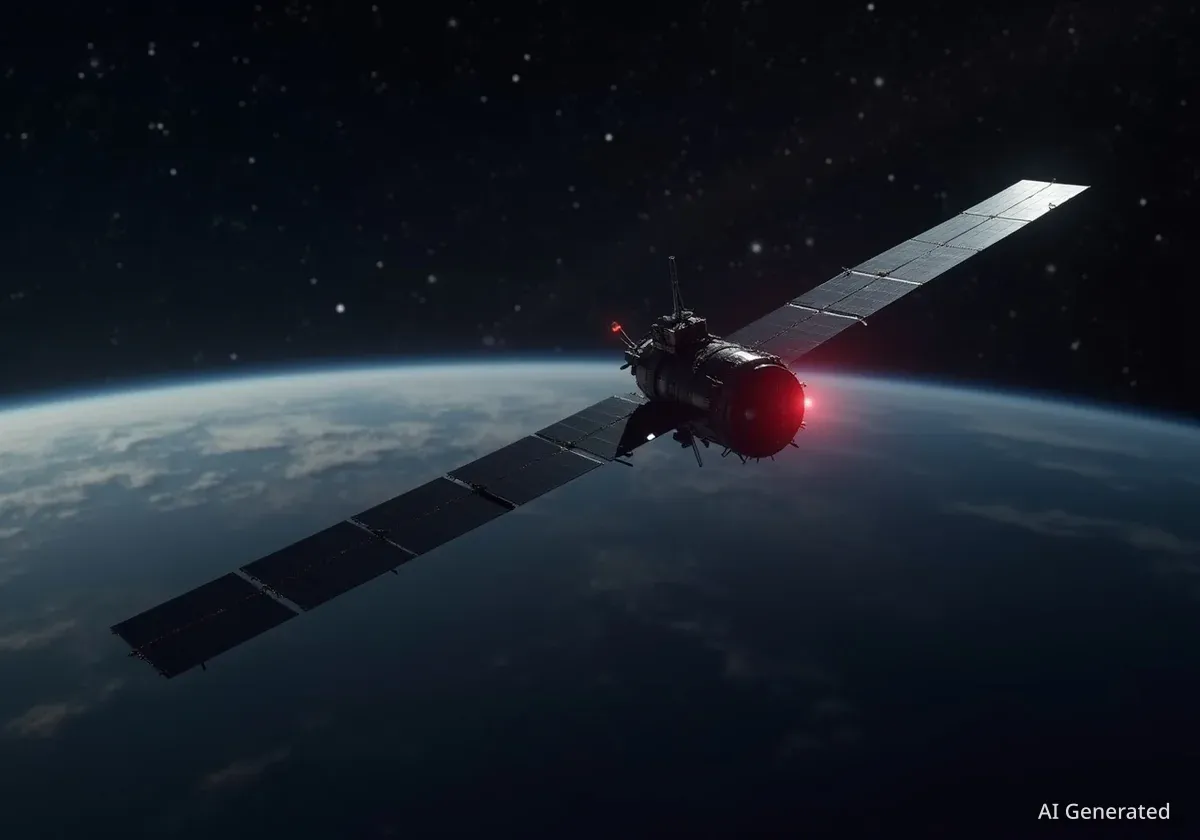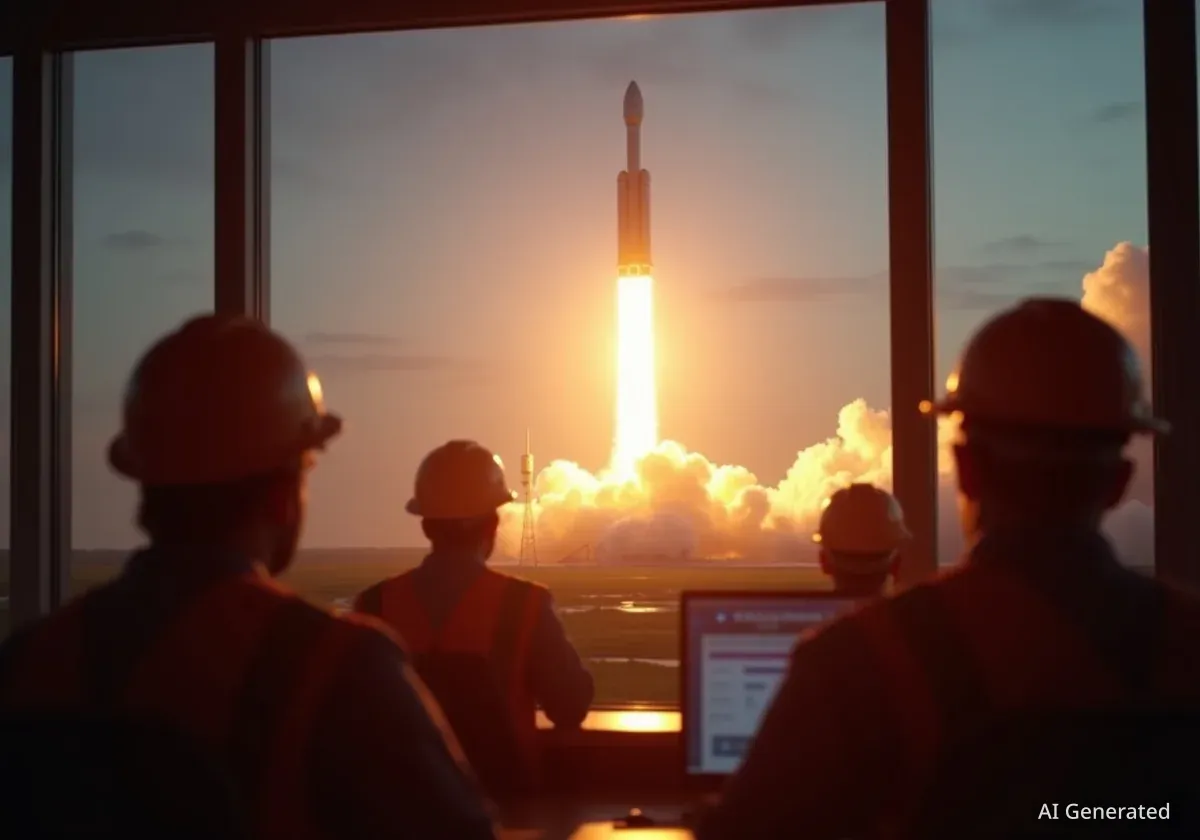A Russian satellite launched in early 2022 is now at the center of international security concerns. U.S. officials and intelligence agencies are closely monitoring Cosmos 2553, a spacecraft suspected of being a test platform for a new type of space-based weapon, potentially capable of carrying a nuclear device.
This development has raised alarms about the potential militarization of Earth's orbit, challenging a foundational international treaty that has prevented an arms race in space for over half a century.
Key Takeaways
- Suspected Weapon Platform: Russia's Cosmos 2553 satellite, launched in February 2022, is believed by some Western officials to be a testbed for a space-based weapon system.
- "Dummy Warhead" Reports: Intelligence reports suggest the satellite may carry a non-nuclear "dummy warhead," indicating a potential design for an anti-satellite nuclear weapon.
- Treaty Implications: The situation puts pressure on the 1967 Outer Space Treaty, which explicitly prohibits placing nuclear weapons or other weapons of mass destruction in orbit.
- UN Veto: In April, Russia vetoed a United Nations resolution aimed at reaffirming the ban on space-based nuclear weapons, increasing international suspicion about its motives.
The Launch of Cosmos 2553
In February 2022, just weeks before the full-scale invasion of Ukraine, Russia launched a satellite designated Cosmos 2553. Initially, the launch was described as a mission to test new onboard systems and components. However, its unusual orbital characteristics and the geopolitical timing quickly drew the attention of Western military and intelligence organizations.
The satellite operates at a higher altitude than many other Earth-observation or communication satellites, a detail that has contributed to the scrutiny. According to U.S. intelligence sources cited in media reports, there is a growing belief that Cosmos 2553 is not a simple technology demonstrator.
The primary concern revolves around the possibility that the spacecraft is designed to eventually carry a nuclear weapon. While current assessments suggest it is carrying a non-explosive "dummy warhead," its purpose is interpreted as a test of the delivery platform itself. This has made the satellite a high-priority subject for continuous monitoring by the U.S. Space Force and its allies.
What is an Orbital Weapon?
A space-based or orbital weapon is a system placed in orbit around a celestial body, such as Earth. Unlike a ballistic missile that travels through space briefly, an orbital weapon would remain in orbit until activated. A nuclear-armed orbital weapon could, in theory, disable vast networks of satellites simultaneously through the generation of a powerful electromagnetic pulse (EMP), disrupting global communications, navigation, and financial systems.
A Challenge to Decades of International Agreements
The concept of deploying nuclear weapons in space is not new. The potential for such a scenario prompted international action decades ago to prevent space from becoming a new battlefield.
The Outer Space Treaty of 1967
In 1962, the United States conducted a high-altitude nuclear test called Starfish Prime. The test detonated a nuclear weapon in space, creating an unexpectedly powerful electromagnetic pulse that damaged several satellites and even caused electrical issues on the ground in Hawaii, nearly 900 miles away.
This experiment provided a stark demonstration of the destructive potential of space-based nuclear detonations. The insights gained from it were a major catalyst for the creation of the Outer Space Treaty of 1967. Signed by the United States, the Soviet Union (now Russia), and the United Kingdom, the treaty forms the bedrock of international space law.
"The Outer Space Treaty bans the stationing of weapons of mass destruction in outer space, prohibits military activities on celestial bodies, and details legally binding rules governing the peaceful exploration and use of space." - United Nations Office for Disarmament Affairs
Russia's current activities with Cosmos 2553 are seen by many as a direct challenge to the spirit and letter of this foundational treaty. If the satellite is indeed a weapons test platform, it represents a significant move toward upending the long-standing international norm against weaponizing space.
Russia's Official Stance and Diplomatic Maneuvers
Russian President Vladimir Putin has publicly denied any intention of placing nuclear weapons in space. He has stated that Russia has "always been categorically against" such actions and has called for adherence to all existing agreements.
However, Russia's actions on the diplomatic stage have contradicted these statements. In April, Russia used its veto power at the United Nations Security Council to block a resolution co-sponsored by the United States and Japan. The resolution was designed to reaffirm the principles of the Outer Space Treaty and call on all nations to refrain from developing space-based nuclear weapons.
The UN Security Council Veto
The resolution received 13 votes in favor, with China abstaining. Russia was the sole nation to cast a veto, effectively blocking its passage. This move was widely interpreted as an attempt to avoid further international oversight and constraints on its space programs.
This veto has significantly amplified international concerns. Critics argue that if Russia's intentions were purely peaceful, it would have had no reason to block a resolution that simply reinforces an existing treaty to which it is already a party.
The Future of Space Security
The controversy surrounding Cosmos 2553 has brought the issue of space security to the forefront of global discussions. As more nations and private companies develop space capabilities, the domain is becoming increasingly congested and contested.
The deployment of an anti-satellite weapon, particularly a nuclear one, could have catastrophic consequences. A single detonation could create a massive field of debris, rendering certain orbits unusable for generations—a scenario known as the Kessler syndrome. It would also cripple the global infrastructure that depends on satellites, including:
- GPS navigation for transportation and logistics
- Global financial transactions
- Weather forecasting and climate monitoring
- Telecommunications and internet services
The international community now faces the challenge of reinforcing existing treaties and potentially creating new frameworks to manage these emerging threats. The situation with Cosmos 2553 serves as a critical reminder that maintaining space as a peaceful domain for exploration and scientific advancement requires constant vigilance, transparency, and robust diplomatic engagement.





